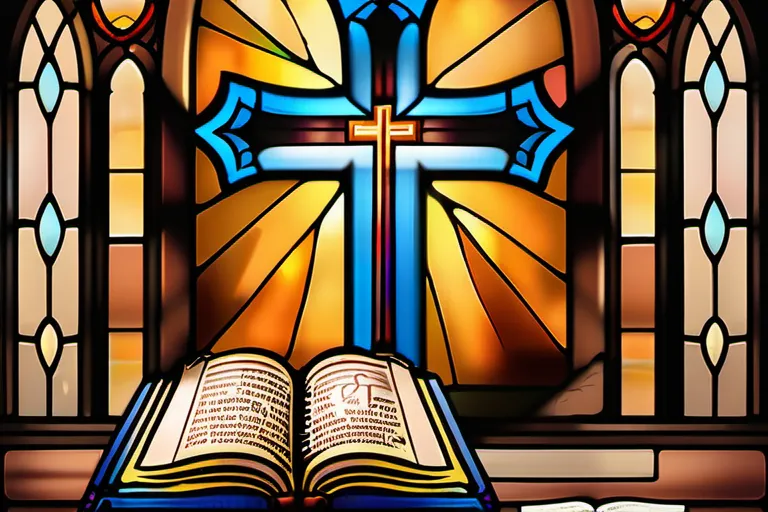Exploring the teachings of Episcopal spirituality, its beliefs, practices, and impact on daily life.
The Episcopal Church is a branch of Christianity that emphasizes tradition, reason, and liturgy. In this article, we delve into the spiritual teachings of the Episcopal religion and how they guide its followers in their daily lives.
The Foundations of Episcopal Spirituality
Have you ever wondered about the foundations that shape Episcopal spirituality? Let’s delve into its rich history and core beliefs to understand how they impact daily life. The Episcopal Church, rooted in Christian tradition yet embracing diversity, offers a unique path to spiritual fulfillment. Is it not fascinating how this church finds balance between ancient traditions and modern interpretations?
The Episcopal Church traces its roots back to the early days of Christianity, blending Anglican practices with Catholic rituals. This fusion creates a community that welcomes people from various backgrounds and beliefs. Imagine a garden where different flowers bloom together in harmony—this is what Episcopal spirituality seeks to achieve. The church’s commitment to social justice and equality adds another layer to its rich tapestry, making it more than just a place of worship but a community of action.
The Nicene Creed, the Apostles’ Creed, and the Book of Common Prayer are central to Episcopal life. These texts provide guidance and a common language for believers to express their faith. How do these ancient words guide your daily journey towards holiness? The emphasis on personal reflection and communal worship encourages introspection and growth in a supportive environment.
The concept of the Eucharist, or Holy Communion, is another cornerstone. This ritual symbolizes the body and blood of Christ, offering believers a tangible connection to the divine. Is it not remarkable how such a simple act can transform one’s perspective on life? Through the Eucharist, Episcopalians find a way to connect with their faith in a deeply personal yet communal manner.
In essence, Episcopal spirituality is about finding balance between tradition and innovation, inclusivity and diversity. It’s a journey that invites everyone to explore their faith, question, and grow. Are you ready to embark on this spiritual adventure?
The teachings of the Episcopal Church provide a framework for a meaningful life, where spirituality is not just a Sunday affair but an integral part of one’s daily existence.
The Role of Liturgy in Episcopal Spirituality
The Role of Liturgy in Episcopal Spirituality: Understand the significance of liturgy in Episcopal worship and its role in fostering a sense of community.
Imagine walking into an Episcopal church, stepping through those doors, and feeling like you’ve entered a sacred space where time seems to slow down. The liturgy becomes more than just a set of rituals; it’s the heartbeat of the congregation, pulsating with prayers, hymns, and readings that connect us to something greater than ourselves. How does this ritualistic practice shape our spiritual journey?
Liturgy is like a bridge between heaven and earth, lifting our voices in praise and prayer. It’s not just about what we do; it’s also about why we do it. Every hymn sung and every prayer recited holds profound meaning, weaving together the threads of our collective faith. Through liturgy, Episcopalians come together in a shared experience that transcends individual differences, binding us in a common bond.
The repetitive nature of the liturgy serves as a comforting reminder of the unchanging truths of our faith. Just like the rosary for Catholics or the Shema for Jews, these practices offer a consistent framework within which we can explore and deepen our spiritual lives. Liturgy provides structure and stability in an ever-changing world, offering us a way to navigate life’s challenges with grace and resilience.
In essence, liturgy isn’t just about the past; it’s also about the future. It invites us to participate in something larger than ourselves, uniting us across generations and cultures. As we move through the rites of the church, we are reminded that our spiritual lives are not solitary endeavors but communal journeys, filled with hope and purpose.
So, next time you find yourself in an Episcopal service, take a moment to appreciate the liturgy. It’s more than just words and songs; it’s a lifeline that connects us to the divine and to one another, shaping our understanding of what it means to be part of this beautiful tradition.
Scripture and Tradition in Episcopal Spirituality
How do Episcopalians view scripture and tradition? Is it like sifting through a treasure trove, where each word holds a hidden meaning waiting to be discovered? In the Episcopal Church, scripture is seen as a living, breathing document that guides believers in their spiritual journey. But how do they interpret these ancient texts?
Imagine scripture as a river, ever-flowing and shaped by the currents of history and culture. Episcopalians believe that tradition provides the necessary context to understand this river’s course. It’s like having a map to navigate through the twists and turns. However, tradition is not seen as static but rather as dynamic, evolving with each new generation.
The Bible, particularly the New Testament, forms the core of Episcopal doctrine. Yet, it’s interpreted through the lens of the Church Fathers and other early Christian writers. This approach ensures a rich, nuanced understanding that goes beyond surface-level readings. For example, when reading about love in the Gospels, Episcopalians might explore how this concept was understood by early Christians and apply those insights to modern contexts.
How do these interpretations impact daily life? Consider the practice of communion, for instance. It’s not just a ritual but an opportunity to reflect on the body and blood of Christ, seen as a symbol of unity and sacrifice. Through such practices, Episcopalians are encouraged to engage with scripture in meaningful ways that shape their moral and ethical decisions.
In essence, scripture and tradition work hand in hand to create a vibrant spiritual life in the Episcopal Church. They offer a framework for understanding the divine while also providing practical guidance for navigating the complexities of everyday existence. As we move forward, these teachings continue to be a source of inspiration and reflection, guiding believers toward a deeper connection with both God and each other.
The Importance of Service in Episcopal Spirituality
Service and social justice are not just buzzwords in Episcopal spirituality; they are the heart of what it means to live as a faithful person within this tradition. How often do we ask ourselves, ‘What can I do today to make a difference?’ In the Episcopal Church, the answer is not just about personal salvation but about actively participating in the betterment of society and the well-being of others.
Imagine a world where every church was a beacon of hope, reaching out to those in need. This vision is more than just a dream; it’s a reality that Episcopalians strive for through their commitment to service. Whether it’s volunteering at a local food bank or participating in environmental initiatives, the call to serve is clear and present.
In fact, many Episcopalians find that engaging in acts of social justice brings them closer to God. It’s as if they are writing their own spiritual script, filled with moments of compassion and sacrifice. These actions not only help others but also enrich the lives of those who perform them, creating a cycle of love and service.
But why is this so important? Isn’t faith enough just to pray and read our Bibles? The truth is that while private devotion is essential, it’s the application of our beliefs in the world around us that truly defines our spirituality. By serving others, we embody the teachings of Jesus Christ, who taught us to love our neighbors as ourselves.
Moreover, when we serve, we are not just helping those in need; we are also healing a broken world. Each act of kindness is like a stitch in a larger tapestry, weaving together a society that values justice and compassion over greed and indifference. This interconnectedness is at the core of Episcopal spirituality, reminding us that we are all part of one human family.
So, what can you do today to make your mark? How will you use your gifts to serve others in meaningful ways? The Episcopal Church encourages us to be stewards of our talents and resources, ensuring that they are used for the common good. By doing so, we not only fulfill God’s call but also enrich our own lives with purpose and fulfillment.
Personal Growth and Development in Episcopal Spirituality
How do we grow spiritually within Episcopal spirituality? Is it just about attending church services and following a set of rituals, or does it delve deeper into personal development? In Episcopal spirituality, personal growth is not seen as an optional add-on but as a core component of the faith journey.
Meditation and prayer are like the soil that nourishes a seed. They provide the conditions for spiritual growth to flourish. Episcopalians believe in regular reflection on their faith through daily prayers and meditative practices, much like watering plants to ensure they thrive. These practices help individuals connect with God and gain insight into their own hearts and minds.
One might wonder how these spiritual exercises translate into real-life situations. Consider prayer as a conversation—much like sharing your thoughts with a trusted friend. Through this dialogue, one can find guidance, solace, and clarity. Similarly, meditation allows for a quiet reflection that helps in understanding oneself better and making informed decisions.
The emphasis on personal growth goes beyond individual practice; it also involves communal support. Just as a tree needs its branches to strengthen its roots, individuals in the Episcopal community rely on each other’s support for their spiritual journeys. This mutual encouragement fosters an environment where everyone can grow together, much like a garden where different flowers and plants thrive side by side.
So, how do you find your path of personal growth within this framework? Start with small steps—perhaps setting aside time each day for prayer or meditation. Reflect on what resonates with you most deeply in the teachings. Remember, it’s not about reaching a destination but rather embracing the journey itself.
Incorporating these practices can transform your daily life, making it richer and more meaningful. Just as a gardener tends to their plants, so too must one tend to their spiritual growth with care and dedication. The result? A fuller, more vibrant experience of faith that impacts every aspect of your existence.
The Impact of Episcopal Spirituality on Modern Life
Imagine walking through a garden, where every plant and tree tells a story of resilience and beauty. In many ways, Episcopal spirituality can be seen as such a garden. It is not just about following strict rules but nurturing a deep connection with God and finding meaning in our everyday lives.
How does this spiritual path influence modern life? Let’s explore its profound impact on contemporary society. The essence of Episcopal spirituality lies in the balance between tradition and innovation, offering a rich tapestry that can enhance one’s perspective on personal growth and community engagement.
One significant aspect is the emphasis on service. Just as planting seeds nurtures life, engaging in acts of charity and compassion serves to nourish the soul. Episcopal churches are often at the forefront of social justice initiatives, advocating for issues such as poverty, homelessness, and environmental sustainability. These efforts not only help those in need but also remind us that our actions can have a ripple effect, changing lives for the better.
Another vital component is the practice of communion. This sacrament symbolizes unity among believers and with Christ, much like a vine gives life to its branches. In today’s fragmented world, this sense of interconnectedness is more crucial than ever. Episcopalians gather not just for worship but also for support and shared experiences, creating a network that strengthens the community both spiritually and practically.
Moreover, the Episcopalian approach to spirituality encourages a personal connection with God through various forms of prayer and reflection. It’s like sitting by a serene pond, where you can observe nature and find peace amidst chaos. This mindfulness and introspection allow individuals to navigate life’s challenges more gracefully, fostering resilience and inner strength.
So, how does this all apply in the fast-paced, often stressful world we live in today? Episcopal spirituality offers a sanctuary—a place to pause, reflect, and grow. It reminds us that our lives have purpose and meaning beyond the immediate demands of daily existence.
In conclusion, the impact of Episcopal spirituality on modern life is profound. By integrating its teachings into our lives, we can cultivate a deeper sense of purpose, compassion, and connection. This spiritual journey is not just about personal growth but also about contributing positively to the world around us, making it a truly transformative experience.
Conclusion
 By understanding the Episcopal approach to spirituality, we gain insights into a unique perspective on faith and life that emphasizes community, service, and personal growth.
By understanding the Episcopal approach to spirituality, we gain insights into a unique perspective on faith and life that emphasizes community, service, and personal growth.











